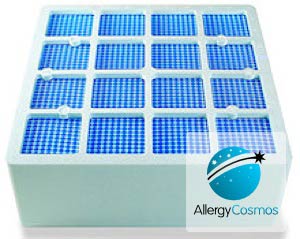We often get asked what an air purifier can filter out of the air. Viruses? Bacteria? Can you capture radioactive dust? The High-Efficiency Particulate Air (HEPA) filter is well established in its ability to trap all particulate pollution, including radioactive particles, viruses and bacteria. What is a HEPA filter? The HEPA filter system was developed by the United States Army Chemical Corps and the United States Atomic Energy Commission during the Manhattan Project (development of the atom bomb) to protect against the spread of radioactive dust. The first HEPA air purifiers were rigid and unwieldy machines, quite unlike their modern counterparts. They contained asbestos imported from Africa or Bolivia. Concern over the health impact of asbestos led to the development of alternative materials. There were also concerns about leaks and defects in the filter so, again, research was needed into a better filter material.
The HEPA filter was by no means the first air purifier. People have always been concerned about the quality of the surrounding air. Leonardo Da Vinci had the notion that finely woven cloth dipped in water would protect the military from toxic powders. At the end of the 18th century, the German explorer and naturalist Alexander von Humboldt devised a primitive respirator for use in mining, while Lewis P. Haslett’s ‘lung protector’, which received its patent in 1848, used moistened wool with a one-way valve to filter dust out of the air.
A true HEPA filter meets the specifications of the United States Department of Energy for DOE regulated applications. Air purifiers labelled ‘HEPA-type’, ‘HEPA-like’ or even ‘99%-HEPA’ will not meet the same performance standards. A true HEPA filter has to be able to remove 99.97% of airborne particles the size of 0.3 micrometres diameter passing through it. Of course, it can remove particles bigger and smaller than this, but it is the 0.3-micrometre particles that are hardest to trap in the filter, so that is why these are the particles used to judge performance.
HEPA technology was ‘top secret’ during the Manhattan Project but, after the war, the government declassified the technology so it could be used in commercial and residential settings. Modern HEPA air purifiers are used in hospitals and in the aerospace, electronics and pharmaceutical industries. In the home, allergy vacuum cleaners fitted with HEPA filters can be used to remove dust containing house dust mites, pollen, pet dander and other particle pollution which might otherwise provoke asthma or allergy symptoms. HEPA filters remove particles by trapping them in a mesh of fibres by one of three different mechanisms (interception, impaction and diffusion) depending on the particle size. But HEPA filters do not remove molecules, so if you want to get rid of, say, Volatile Organic Compounds, you would need a system that also incorporates activated carbon which will adsorb gases.




